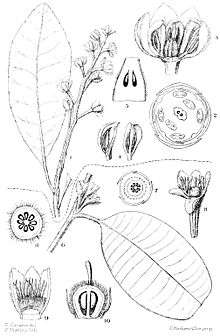Sphenostemon
Sphenostemon is the genus of small evergreen trees or shrubs native to New Guinea, Queensland (Australia) and New Caledonia. They have opposite or spiral leaves, and at most small stipules. The small flowers, borne in terminal inflorescences, have free (i.e. unjoined) sepals and petals. The anthers have thick filaments. The fruit, a berry, is fleshy and contains two seeds. The genus is described as "particularly poorly known".[2]
| Sphenostemon | |
|---|---|
 | |
| Sphenostemon comptonii | |
| Scientific classification | |
| Kingdom: | Plantae |
| Clade: | Tracheophytes |
| Clade: | Angiosperms |
| Clade: | Eudicots |
| Clade: | Asterids |
| Order: | Paracryphiales |
| Family: | Paracryphiaceae |
| Genus: | Sphenostemon Baill.[1] |
| Species | |
|
Sphenostemon balansae | |
Taxonomy
In the 2009 APG III system, the genus is placed in the family Paracryphiaceae, along with Paracryphia and Quintinia.[3] The earlier APG II system placed it alone in family Sphenostemonaceae.[4]
References
- "IPNI Plant Name Query Results for Sphenostemon", The International Plant Names Index, retrieved 2014-09-19
- Stevens, P.F., "Paracryphiaceae", Angiosperm Phylogeny Website, retrieved 2014-09-19
- Angiosperm Phylogeny Group (2009). "An update of the Angiosperm Phylogeny Group classification for the orders and families of flowering plants: APG III". Botanical Journal of the Linnean Society. 161 (2): 105–121. doi:10.1111/j.1095-8339.2009.00996.x. Archived from the original (PDF) on 2017-05-25. Retrieved 2013-06-26.
- The Angiosperm Phylogeny Group (2003). "An update of the Angiosperm classification for the orders of flowering plants: APG II". Botanical Journal of the Linnean Society. Linnean Society of London. 141 (4): 399–436. doi:10.1046/j.1095-8339.2003.t01-1-00158.x.